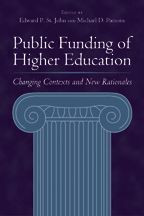
Reviews
An important contribution that not only provides a diagnosis of the main problems facing US higher education but also offers some solutions.
McMahon has written a serious and important book on the economics of higher education... This book is a must-read for students interested in the economics of higher education and should be included as a required reading in such courses... McMahon's extension and revitalization of human capital theory in higher education should be of interest to a general readership in the field.
This extraordinary book patiently, thoughtfully, and thoroughly provides the conceptual framework for understanding the higher education market, the empirical findings about what that market produces and the policy prescriptions needed to make it work better in the future.
No one else before McMahon has systematically and comprehensively presented the whole picture of higher education benefits and provided a valuation of the private and social non-market benefits.
This is a significant contribution to both theory and research findings in the study of investment in higher education... Highly recommended.
The overwhelming success of this work is that McMahon has articulated clearly and succinctly what students, their families, and governments are getting for their investment in higher education.
A timely and insightful text... Academic advisors who want to show their students that a college degree offers benefits beyond starting salaries and career opportunities will find this book to be a valuable resource.
It is not surprising that there is a growing interest in the private and social benefits of higher education and discussion of who should pay for what. Professor McMahon’s book... is central to this debate.
The first book to systematically identify and develop the evidence necessary to measure comprehensively the benefits of higher education and to estimate their economic value.
Walt McMahon's Higher Learning, Greater Good is an important book made even more so by the current economic crisis. This insightful volume derives from a lifetime of scholarly exploration and arrives at a time when a clear understanding of the economic benefits of higher education has never been more crucial. Through his analysis of the market and non-market returns on higher education, McMahon makes clear the chronic underinvestment in higher education and the serious ramifications for both individuals and society. Higher Learning, Greater Good is a detailed and thoughtful contribution to education and policy debates that deserves a careful reading by all who care about the future.
Book Details
Preface
1. What Is the Problem?
2. Challenges Facing Higher Education Policy
3. Higher Education and Economic Growth
4. Private Non-Market Benefits of Higher Education and Market Failure
5. Social Benefits
Preface
1. What Is the Problem?
2. Challenges Facing Higher Education Policy
3. Higher Education and Economic Growth
4. Private Non-Market Benefits of Higher Education and Market Failure
5. Social Benefits of Higher Education and Their Policy Implications
6. University Research
7. New Higher Education Policies
8. New Strategies for Financing Higher Education
Appendixes
A. Correcting for Ability Bias in Returns to Higher Education
B. A Simplified Dynamic Model with Higher Education Externalities
C. Valuing the Effects of Higher Education on Private Non-Market Outcomes
D. Higher Education and Growth, U.S. and OECD Countries, 1960–2005
E. Valuing the External Social Benefi ts of Higher Education
References
Index




